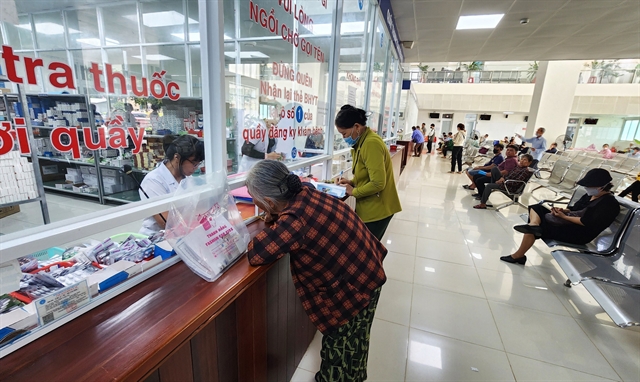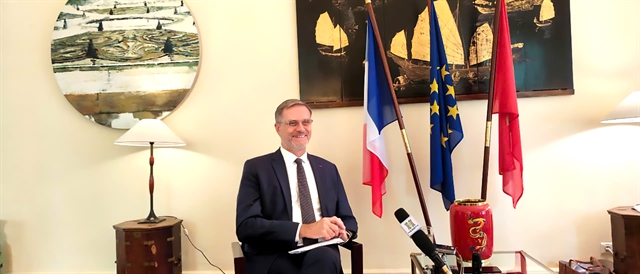 Opinion
Opinion

 |
| French Ambassador to Việt Nam Olivier Brochet. VNS Photo Khánh Linh |
As France celebrates its National Day on July 14 and approaches the first anniversary of elevating ties with Việt Nam to a Comprehensive Strategic Partnership on October 7, French Ambassador to Việt Nam Olivier Brochet spoke with the press to reflect on key milestones in bilateral relations and share his outlook on future cooperation.
The Việt Nam–France Comprehensive Strategic Partnership has made significant strides in 2024 and the first half of 2025, particularly marked by French President Emmanuel Macron’s visit to Việt Nam in May. What would you highlight as the most notable outcomes of this relationship so far?
I believe there are three key words that best capture the current momentum in France–Việt Nam relations: friendship, partnership and trust.
Friendship is one of the most deeply rooted characteristics of the France–Việt Nam relationship, forged over a long and complex shared history. Both countries value this uniqueness, reflected in our shared willingness to look back at the past with calm and goodwill.
During President Emmanuel Macron’s visit to Việt Nam this year, he and Party General Secretary Tô Lâm planted a friendship tree at the Presidential Palace's Hồ Chí Minh Relic Site near Ba Đình Square, where 80 years ago, President Hồ Chí Minh proclaimed Việt Nam’s independence. It was a powerful symbol of the special ties between our two nations.
Second, the Comprehensive Strategic Partnership was the outcome of General Secretary Tô Lâm’s visit to Paris in October last year. In the eight months since, both sides worked intensively to prepare for President Macron’s visit to Việt Nam, culminating in the signing of around 30 agreements that span the entire spectrum of bilateral cooperation.
These include major deals in defence with a letter of intent to deepen cooperation between the two defence ministries, sustainable development in energy transition and transport infrastructure, especially railways, and innovation, including healthcare and a government-to-government agreement on scientific research.
One of the most significant agreements was signed between the French Development Agency and Việt Nam Electricity, the first Just Energy Transition Partnership agreement signed in Việt Nam. It paves the way for future partnerships to support Việt Nam’s energy transition and its 2050 carbon neutrality commitment.
Third, is trust. It is no coincidence that President Macron began his Southeast Asia tour in Việt Nam. This choice reflects the high regard he has for Việt Nam and his desire to promote a partnership based on mutual trust. This spirit was evident in his exchanges with Việt Nam’s top leaders, where both sides reaffirmed their shared commitment to contributing to international peace and stability, upholding international law and supporting a rules-based global order.
Việt Nam has recently launched its most extensive administrative reform in decades. How do you assess this process and its potential impact on Việt Nam–France cooperation?
Like many international observers, we are deeply impressed by the scale and pace of Việt Nam’s administrative reform, as well as its initial achievements in both at the central and local levels. I have witnessed firsthand the substantial workload local officials are shouldering, but also their strong determination to deliver results on schedule.
We understand that the reform, initiated under the leadership of General Secretary Tô Lâm, aims to build a more efficient administrative system and accelerate decision-making. From the perspective of embassies, development partners and foreign investors committed to long-term engagement with Việt Nam, we are eager to see tangible outcomes.
Successful reform, I believe, will create strong momentum for expanding bilateral cooperation, including between France and Việt Nam.
On our side, we stand ready to support Việt Nam through long-established administrative cooperation programmes at both central and local levels. We also hope to welcome more Vietnamese officials and leaders to France for training programmes at the National Institute of Public Service or other leading French administrative institutions. Our goal is to foster two-way exchanges, not just in technical expertise but also in modern governance practices, drawing on France’s own public administration reform experience.
Việt Nam–France bilateral trade is projected to grow nearly 13 per cent in 2024, reaching over US$5.4 billion. What are the main drivers of this growth, and which sectors hold the most promise for future economic cooperation?
We are delighted by this growth, which benefits both countries. French exports to Việt Nam continue to rise, as do Vietnamese exports to France. We are confident about the future of French exports to Việt Nam, particularly in key sectors.
In aviation, 2025 marks significant deals with Airbus, including 20 A330neo aircraft for Vietjet as part of President Macron’s visit, and an earlier order of 100 A320 and A321 aircraft at the Le Bourget Air Show. These deliveries will span the next 10–15 years and represent a major contribution to France’s export volume to Việt Nam.
Healthcare has been one of France’s top export sectors to Việt Nam in recent years and continues to grow steadily. France’s medical industry is globally recognised and demand among Vietnamese consumers is rising. Việt Nam is not only a market but also a partner under the Comprehensive Strategic Partnership. A landmark agreement was signed between Sanofi and Việt Nam’s leading vaccination network, VNVC, to build a major vaccine manufacturing facility near HCM City, allowing Việt Nam to produce vaccines developed in Sanofi’s labs.
In agriculture and food, trade is also expanding to meet the evolving demands of Việt Nam’s population, especially the growing middle class. French products, from agricultural goods and processed foods to wine, are well aligned with Vietnamese consumer preferences. For all these reasons, we believe our bilateral trade will continue to thrive in the years to come.
Amid today’s global trade tensions, what do you see as priority levers to enhance Việt Nam–France economic ties?
Việt Nam holds a major advantage in having signed and implemented the EU–Việt Nam Free Trade Agreement (EVFTA). Among ASEAN nations, only two currently have such agreements with the EU. The EVFTA is a critical, well-balanced and forward-looking deal that provides predictability for bilateral trade.
We hope the agreement will not be negatively affected by other trade deals negotiated under less favourable conditions. Most importantly, both sides must continue fully honouring their commitments under the EVFTA, which so far has been the case. However, we must remain vigilant about the risk of non-tariff barriers being applied in a non-transparent manner, which could undermine the agreement’s true value. – VNS




